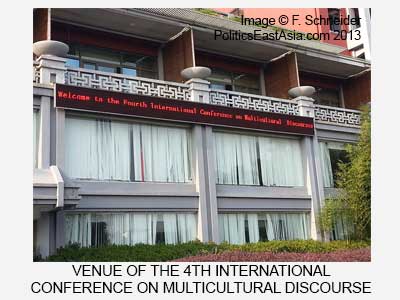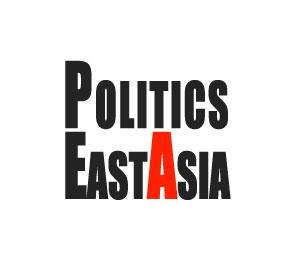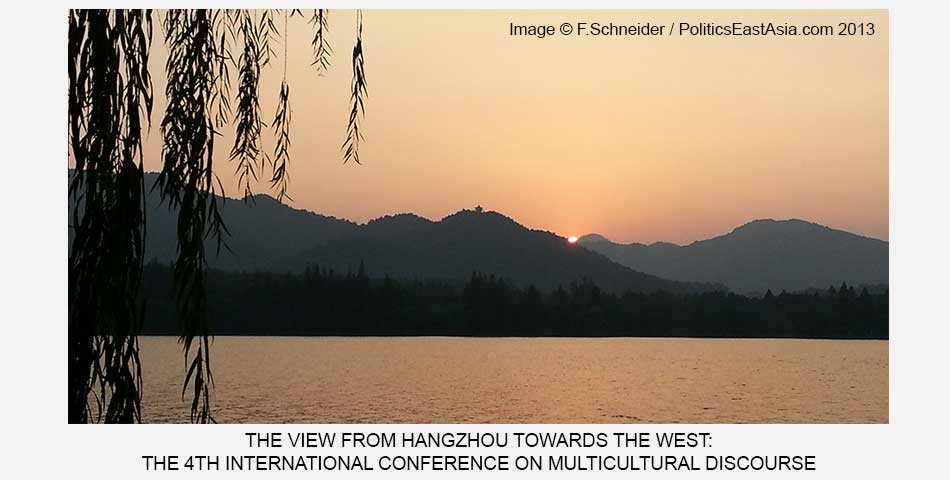Thoughts on the Fourth International Conference on Multicultural Discourse
Is Discourse Analysis a “Western” Project?
Last week, I had the pleasure to attend a fascinating conference in Hangzhou: the Fourth International Conference on Multicultural Discourse. Many academic events are international, but few can claim to take cultural diversity as seriously as the organizer Prof. Shi-xu, who managed to gather participants from over three dozen countries to present a wide range of research on communication and social practices in different cultural contexts.
Why multicultural perspectives on discourse matter
As someone who likes to think of discourse analysis as a way to study how politics work through verbal as well as non-verbal communication, I found the many well-informed and carefully designed studies at this conference inspiring: not only did the event offer a space to present and discuss methods like semiotic analysis, qualitative linguistic studies, or the quantitative analysis of a large corpus of text, but the research also demonstrated how such methods can be tailored to different social contexts and languages. For instance, in an exciting talk about how specific Ethiopian communities traditionally settle marriage conflicts, Alemu Desasa fruitfully deployed language recordings and participant observation to map out the structures of mediation rituals, and to explore whose interests such proceedings serve. As it turns out, the village elders who run such meetings are careful to assure that women are treated fairly in such proceedings, but the way the language is structured nevertheless implicitly reproduces stereotypical gender roles of the provider-husband and the maternal-wife. This is a fascinating case, because it shows how small-scale practiced in people’s day-to-day lives constrain what they can legitimately say and do.
 In another talk, Nandita Dogra presented the findings of her new book Representations of Global Poverty, which deals with the ways in which organizations like Oxfam use highly racist imagery and language to “sell” their developmental aid model to the public. The book has moved to the top of my reading list. As Dogra explains, the effect of many aid campaigns is that they re-enforce questionable and reductionist views of the so-called “Third World” rather than challenging such perspectives and developing a more nuanced understanding of how poverty and human suffering play out in diverse settings. I was reminded of the brilliant parody of such aid campaigns that Norwegian students put together to highlight exactly this sort of narrow view of development.
In another talk, Nandita Dogra presented the findings of her new book Representations of Global Poverty, which deals with the ways in which organizations like Oxfam use highly racist imagery and language to “sell” their developmental aid model to the public. The book has moved to the top of my reading list. As Dogra explains, the effect of many aid campaigns is that they re-enforce questionable and reductionist views of the so-called “Third World” rather than challenging such perspectives and developing a more nuanced understanding of how poverty and human suffering play out in diverse settings. I was reminded of the brilliant parody of such aid campaigns that Norwegian students put together to highlight exactly this sort of narrow view of development.
On a topic more closely related to my own research, I was intrigued by the discourse studies that my colleagues presented on the East China Sea conflict between the Chinese and Japanese governments. Lut Lams, for instance, has conducted a detailed language analysis of how Chinese newspapers present this issue, and she has found that the reporting collapses the complex topic into a simple black-and-white story in which the deplorable Japanese aggressively attack the peaceful victim China. What is particularly interesting is that another presenter, Yuan Yuan, has found very similar discursive practices in Japanese-language newspapers: in those publications, China is portrayed as a dark and evil authoritarian place which lacks civilized behaviour and morality – a story that legitimizes a conservative hard-liner stance on this territorial dispute in Japan. The way in which this conflict is constructed as “us-vs-them” stories on both sides says much about the importance that communication plays in East Asian international relations. What is more, it highlights a worrying trend towards popular nationalism in Chinese and Japanese politics. Such studies have very real implications: they shine a spotlight on issues that policy makers need to carefully address: the lingering historic animosities between the countries, the role that these animosities have on public opinion, and the ways in which this public opinion feeds back into attempts to resolve the conflict at the inter-governmental level.
The critique of discourse analysis
What all of these study show is how rich types of materials can be studied at linguistic and non-verbal levels, and how those forms of communication shape social relations in various cultural contexts. At the same time, they allow for a broader discussion about the value of discourse analysis as a research method. An important question at the conference has been whether discourse analysis is itself inherently “Western”, and whether those who use the method of discourse analysis reproduce the assumptions and biases (and possibly specific ideologies) of the European and American academics who developed this method of doing research.
According to this line of argument (Shi 2012), approaches like critical discourse analysis are marked by a specific worldview, but they mask this worldview by claiming to be objective. What is more, these approaches ignore specific social and historical contexts and focus only on the content of communication. This worldview, so the argument goes, draws up clear dichotomies, such as between reality and its representation, or between power and resistance, and this is seen as a “Western” way of thinking. By being trapped in the same mind-set that also informs other “Western” inventions, like capitalism, imperialism, or colonialism, any such approach is doomed to reproduce the kind of oppression it tries to unmask.
What follows from this argument is that people from outside the so-called “West” should come up with ways to study discourse that are informed by their own local traditions and modes of thought. For instance, a “Chinese” approach to discourse analysis might draw from China’s rich Daoist and Confucian traditions. According to proponents of this view, Chinese culture has an inherently “harmonious” outlook, leading Chinese communication analysis to pay attention to something that their foreign colleagues might miss: that people often try to not offend other as they communicate, and that this leads to closure and cooperation rather than resistance and conflict. Similarly, Chinese thought is believed to work without dichotomies, in a Yin and Yang fashion, so that something that “is” also always simultaneously “is not”. This perspective promotes a view in which there is never a single “truth”, but instead various different viewpoints. Chinese thought, so the argument goes, is comfortable with many “truths”. Concepts and ideas have no “outside”, but are able to live in unison with other concepts, just like Chinese culture is believed to have no “outside” and be fundamentally inclusive.
Four reasons why I would not abandon critical discourse analysis just yet
There are various reasons why I sympathize with attempts to challenge existing paradigms. In particular critiques of political and social theories that claim to be “objective” make a good point: as Robert Cox put it, “theory is always for someone and for some purpose”.
Despite this very valid criticism, I am not convinced that discourse analysis is guilty of the many charges levied against it. I neither think that it is a questionable “Western” project that claims to be objective, nor do I believe that a better project would have to devise a discourse approach based on the culture of a specific country. Here are four reasons why I remain skeptical:
1) It is not the method that is ideological, but what people do with it. A method is a tool, and as such it can be deployed in different contexts, and for different purposes. By picking up a hammer, I am not committing to a particular worldview. I can tear down walls with it, but I can also use it to build them. If my hammer does not allow me to perform a specific task, I can always put it down and pick up another tool.
One could argue that to a person with a hammer, everything starts to look like a nail, but is it really the hammer that causes such an effect, or is it the person wielding the hammer? There are examples of people who use statistics in ways that are manipulative and highly problematic, yet there are also those who deploy them in ways that are useful. The same is the case for qualitative analyses, for critical approaches, for digital methods, etc.
In a way, the argument that methods are ideological reminds me of the argument that ordinary language is ideological, and that the only way to escape domination is to develop a new complex language that avoids the trappings of being ordinary. The sociologist Pierre Bourdieu has made such an argument, and it remains popular with many postmodern theorists today. The psychologist Michael Billig (2013) has responded to this charge that “we can use ordinary words to explore, contradict and reject the meaning of ordinary words”, and that “the poor can complain of the injustice of their poverty, and the oppressed of their oppression, without the aid of technical terms”. I am inclined to agree.
2) Discourse analysis is not about asserting simple dichotomies and absolute truths – it is about dismantling them. As conference contributor Johnny Unger (2006) has written, discourse analysts try to “challenge dominant discourses, be they Western or non-Western, and bring to light hitherto hidden, marginalized discourses, irrespective of culture”. In fact, many of the early discourse analysts, such as Chouliaraki and Fairclough (1999), are unapologetically subjective about their studies, explicitly siding with the “underdogs” of their case studies – something I personally feel can blind scholars to the ways in which the supposedly morally superior oppressed may also use exploitative rhetoric to assert dominance over the alleged oppressor. I am somewhat surprised to learn that the problem in such cases is not that the scholarship is biased, but that it is not biased enough.
As for the idea that discourse analysis ignores contexts and focuses only on content, I would very much like to learn which authors are guilty of such an indeed questionable practice. A good study of communication traditionally looks at three things: the production of content, the content itself, and its usage in various contexts (Thompson 1995). Discourse analysis is no exception, as scholars like Ruth Wodak and her colleagues (2009) have made clear.
3) Theories and concepts do not belong to any one culture, they belong to people in diverse situations. If we narrowly define “cultures” around essential cores that overlap with present-day nations, we risk ignoring that culture is something that people make in their everyday interactions. As two contributors at the conference noted, none of us has only one “culture” – we each draw from a whole range of frameworks to make sense of the world we inhabit, and consequently every interaction is “intercultural”. Ideas are not valuable because they are believed to be Indian, or Chinese, or Brazilian, or French. They are valuable because they address a problem that someone somewhere has encountered.
This is why it is indeed important to promote holistic, dialectic views of the world: such views allow us to see problems in fresh ways, and come up with useful approaches to explore these problems that we might otherwise dismiss. I am not entirely sure why it should matter whether it was a German philosopher, a Greek philosopher, or a Chinese philosopher who came up with such a view, and whether that view was first expressed 200 years ago or over 2000 years ago.
4) Today’s resistance can be tomorrow’s oppression. According to the critics, the solution to the perceived “Western” biases in discourse analysis is that future research needs to draw from cultural ideas that originate outside of the so-called “West”. While I am intrigued by the idea that local, social practices might raise questions and highlight research methods which are helpful, and which may have been previously overlooked, I am wondering what counts as “local”. In much of the discussion with Chinese colleagues, I have the impression that “local” primarily means “Chinese”. I learned, for instance, that a “Chinese” discourse theory would have to use the standardized Chinese language Putonghua, and that it should focus strongly on Confucian thought. What strikes me as odd is that I have not heard any demands that discourse analysis should draw from the traditions common in Canton, or from the modes of thought that Hui minority Muslims use, or from the social practices of Minnan-dialect speakers. It seems the “local” is meant to promote a specific version of Han Chinese culture. If this is the case, isn’t this new approach then “dominating” over potential alternatives much like the perceived “Western” approach is believed to do?
What is more, claiming that Chinese culture is “essentially” and “normally” harmonious and willing to live with contradiction is itself a discursive practice which should be subjected to critical analysis. Chinese colleagues are not above insisting that their data shows the “truth”, or that there are “obvious” differences between “the West” and “China”, and in this they are just as flawed and human as other scholars. Dichotomies and absolute truths, it seems, are not owned by the members of any one “culture”.
Conclusion: What’s next for multicultural discourse?
Overall I may still need a bit more convincing before I accept that a critical approach to communication practices is by default a way to promote Western imperialism. I am happy to stand corrected, of course. After all, I respect anyone who argues that the politics and economics of our world are biased and exploitative, and that we should expose these deficiencies wherever we find them. However, I think that many of the large-scale forms of oppression and power abuse that are associated with the “West” today are the outcome of behaviour that is at its core human, not “Western”. As much as the unfair system we live in today deserves to be questioned, so too do we need to be critical of the kinds of human practices that made that system possible in the first place – and these practices are engrained in much smaller units than nation-states, or imagined regions such as “East” and “West”. They are part of the daily interactions of people around the world, and throughout history. That is precisely what discourse analysis can help us understand.
What I am looking forward to seeing from colleagues who wish to make their mark on the study of discourse is a creative use of ideas and practices to explore how power relations play out in culturally diverse settings. The contributors at this conference have provided impressive examples of how this can be done, and they have demonstrated that being a good scholars, whether in discourse studies or elsewhere, always means taking a critical stance not only towards the object of our studies, but also towards ourselves.
References
Billig, Michael (2013): Learn to Write Badly – How to Succeed in the Social Sciences. Cambridge: Cambridge University Press.
Chouliaraki, Lilie & Fairclough, Norman (1999): Discourse in Late Modernity – Rethinking Critical Discourse Analysis. Edinburgh: Edinburgh University Press.
Shi, Xu (2012): “Understanding Contemporary Chinese Political Communication – A Historico-Intercultural Analysis and Assessment of its Discourse of Human Rights”. Journal of Language and Politics 11/1: 93-114.
Thompson, John B. (1995): Media and Modernity: A Social Theory of the Media. Cambridge: Polity Press.
Unger, Johnny (2006): “A Cultural Approach to Discourse by Shi-Xu – A Review”. Language in Society 35/4: 617-620.
Wodak, Ruth, Rudolf de Cillia, Martin Reisigl, & Karin Liebgart (2009): The Discursive Construction of National Identity. Edinburgh: Edinburgh University Press.
Share This Post, Choose Your Platform!
2 Comments
Comments are closed.



Hello terrific website! Does running a blog like this require
a massive amount work? I’ve absolutely no understanding of computer programming
but I had been hoping to start my own blog in the near future.
Anyways, should you have any suggestions or tips for new blog owners please share.
I know this is off topic nevertheless I simply had to ask.
Thanks a lot!
No worries at all – if you like, send me an email through the contact section (under the about tab), and I’ll be happy to help with advice if I can.